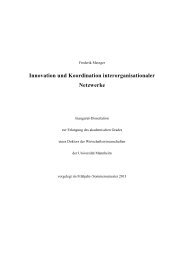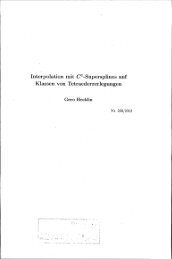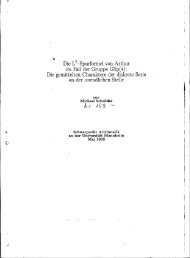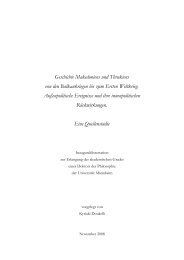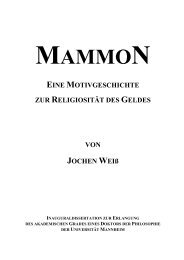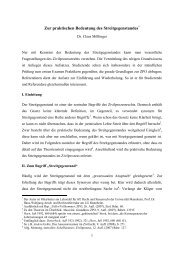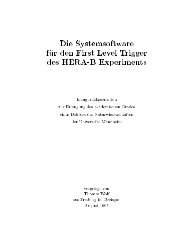Design and Implementation of a Documentation Tool for ... - MADOC
Design and Implementation of a Documentation Tool for ... - MADOC
Design and Implementation of a Documentation Tool for ... - MADOC
Create successful ePaper yourself
Turn your PDF publications into a flip-book with our unique Google optimized e-Paper software.
The <strong>for</strong>script child process should now have been replaced with the shell.<br />
If execution reaches code after execl(), an error occured <strong>and</strong> the child process<br />
will terminate with an error message.<br />
33a 〈execute the shell 32d〉+≡ (31c) ⊳ 32d<br />
perror(shell);<br />
die("execing the shell failed", 0);<br />
Uses die 23b.<br />
A.11 H<strong>and</strong>ling Input <strong>and</strong> Output<br />
While script <strong>for</strong>ks twice <strong>and</strong> utilizes separate processes to h<strong>and</strong>le input <strong>and</strong><br />
output to <strong>and</strong> from the client application, <strong>for</strong>script uses a single process <strong>for</strong><br />
both tasks, taking advantage <strong>of</strong> the select() function (defined in select.h)<br />
that allows it to monitor several open file descriptors at once.<br />
33b 〈includes 8b〉+≡ (15b) ⊳ 31a 38a ⊲<br />
#include <br />
Input <strong>and</strong> output data will never be read simultaneously. There<strong>for</strong>e, a single<br />
data buffer is sufficient. Its size is BUFSIZ bytes, which is a constant defined in<br />
stdio.h <strong>and</strong> contains a recommended buffer size, <strong>for</strong> example 8192 bytes. The<br />
number <strong>of</strong> bytes that have been read into the buffer by read() will be stored<br />
in count.<br />
If the main loop exits, the child has terminated. done() is called to flush<br />
data <strong>and</strong> tidy up the environment.<br />
33c 〈doio 33c〉≡ (15c)<br />
void doio() {<br />
char iobuf[BUFSIZ];<br />
int count;<br />
〈preparations <strong>of</strong> main loop 34a〉<br />
〈the main loop 35c〉<br />
done();<br />
}<br />
Defines:<br />
doio, used in chunk 9.<br />
Uses done 37d.<br />
Preparing the Main Loop<br />
The select() function is supplied with a set <strong>of</strong> file descriptors to watch, stored<br />
in the variable fds. It returns in sr the number <strong>of</strong> file descriptors that are ready,<br />
or −1 if an error occured (<strong>for</strong> example, a signal like SIGWINCH was received).<br />
Additionally, it requires the number <strong>of</strong> the highest-numbered file descriptor plus<br />
one as its first parameter. On all Unix systems, stdin should be file descriptor 0,<br />
33




